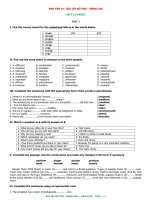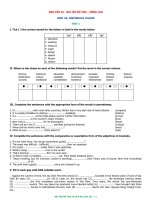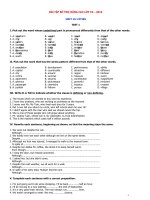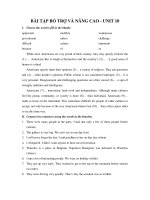- Trang chủ >>
- Mầm non - Tiểu học >>
- Lớp 4
Bài tập bổ trợ unit 10
Bạn đang xem bản rút gọn của tài liệu. Xem và tải ngay bản đầy đủ của tài liệu tại đây (395.73 KB, 8 trang )
li. Complete the words under the pictures with -ity or -iffve, then mark the stress
syllable in each word. Say the words aloud.
5. major. 10. opportun
Il. Match the means of communication in the box with the pictures. W
cell (mobile) phone = computer fax machine letter magazine
radio telephone television |
newspaper pager
120
IV. Complete the sentences with the words in the box.
conference — connecting conversations email online:
post share signal telepathy texting .
1, | cannot contact her by mobile phone - the network is SO weak
here,
2. We'll an article next week revealing the results of the experiment.
3. For more information about the English courses, please. me att:
4, We had a video yesterday. Mr. Taylors joined us from Australia,
and Ms. Young from Canada.
5. Today there are many different ways to communicate _ including
social networking, chat, VoIP and blogging.
6. The supposed process of communicating through means other than the senses, as
the direct exchange of thoughts is called
7. Chat and instant messaging programmes allow you to have with
your friends or just write them a quick note.
8. Twitter lets you brief messages (or “tweets”) with the entire
worlds or with just your circle of friends.
9. The Internet isn’t just about finding information. It's about with
friends, family and people you've never met before.
10. What's she here? | cannot understand this shorthand.
V. Put the verbs in brackets in Past continuous, Present continuous or Future continuous
te complete the sentences.
1. This time tomorrow | (chat) with my cousin in Sydney on Skype,
2. When| (call) you this morning, my mobile phone was dead.
3. We (have) a video conference at the moment.
4, People (not send) snail mail any more in 2040.
5. They (use) signs to communicate with each other at this time yesterday.
121
6, My brother (not work) in the field of communication now.
7. “I (not text) you at 11 p.m. last Sunday”, said Peter.
8. Mr. Nam (deliver) a speech at the National University at 10.30 a.m.
next Wednesday.
9. | (get) a lot of emails from customers these days.
10. We (communicate) by using social media in five days’ time.
VI. Use the verbs from the hex into V-infinitive or V-ing te complete sentences.
call chat create keep make
meet post send use work
1. I've decided __ anew Skype account.
2. Would you mind me your home address, Mrs. Taylor?
3. Mr. Lam would prefer landline phones for personal calls.
4, I've tried her many times, but there have been no answers.
5. Avoid personal information on Facebook.
6. I'd like a call from my Gmail account.
7, My brother dislikes about politics and religions.
8. They planned in touch with each other by using emails.
9. We don't like video chatting. We enjoy F2F.
10. Tom agreed us at Galaxy Nguyen Du.
Vil. Choose the best answer for each of the following sentences.
1. In a message board you can messages or post questions.
A. raise B. arrive C. text D. leave
¿. You shrug your shoulders means “ "
A. \'m happy. B. 1 don’t know.
C. I'm angry. D. Sorry. [need to go now.
122
3, Using music, codes or signs to communicate is called communication.
D. non-public
A. verbal B. non-verbal C. public
4. experienced one communication in Japan when | didn't understand their body
languages.
A. breakdown B. technique C. ability D. device
5. You should try looking for his telephone number on the company as it may be
D. forum
there.
A. logo B. email C. website
6. John managed his family in England by using Zalo.
A. contact
B, to contact C. contacting D. to contacting
7, They advised_____ video chatting in the next meeting.
A. use B. to use C. using D. will use
8. We to have an Internet connection installed in our house next week.
A. completed B. suggested C. admitted D. arranged
9, They about video conferences at this time next Monday.
A. will talk B. will be talking
C. are talking D. are going to talk
10, We with each other by mobile phone in 2050.
A. won't be communicating B. aren't communicating
C. haven't communicated D, aren't going to communicate
VIH. Fill in each numbered blank with a correct word te complete the following passage.
The Internet is the world’s largest computer network with over 100 million users
worldwide and this number (1) doubling from year to year. The Internet
is like an international highway of information. Now, you can sit at your computer,
choose a route and (2) at your destination -that is, the information you
need. Today, from your computer, you (3) access a library in one country,
talk to an expert on a certain topic in a second country and send your (4)
information to someone doing research in a third. So, we don’t know what will be
(5) in the not-too-distant future.
123
The Internet was born (6) scientists attempted to connect the American
to exchange information.
Defence Network to other satellite networks in (7)
Soon, scientific and educational institutions as well as research departments became
linking up, and, before long, the Internet had expanded
interested (8)
into an international information and communication network.
all the countries in the world. You can be
The Internet now (9)
connected to the Internet directly through your own computer or you can hook up to
access system which allows you to use some of the Internet's services.
(10)
IX. Read the following passage and choose the best answer for each question.
Telephones help people speak to one another when they are apart. For more than a
hundred years, nearly every telephone was a landline. A landline telephone is one that
needs to be connected by a wire to a network of other telephones. Because of the
wires, people could not take those telephones with them when they jeft their homes
or offices.
What if you had to make a call while you were away from home? You had to find a
pay phone, Pay phones are landlines found in public places. Many pay phones are on
the street. You can make a call from inside a glass or metal space called a phone booth.
Once you are inside the booth, you put coins into a slot in the phone to make a call.
Telephones have seen a lot of progress. Today, many people carry cell phones. Cell
phones do not need to be connected with wires. They can be used almost anywhere
and can fit in an adult's hand.
Many cell phones sold today are smart phones. A smart phone is a cell phone that
has lots of computer-style features. For example, people use smart phones to check
e-mail and go on the Internet. And all that can be done using something small enough
to carry in a pocket!
1, What is a landline telephone?
A.a telephone that can be carried around in your pocket and used anywhere
B. a telephone that can be used ina public place
C.a telephone that needs to be connected by a wire to a network of other telephones
D. a telephone that can be used to check e-mail and go on the Internet
124
2, The article describes an example of a landline, What is an example of a landline?
A.a pay phone B, a smart phone
C.a cell phone D. a mobile phone
3. Pay phones are probably not used as much today as they were in the past. What piece
of evidence supports this conclusion?
A. Many people today carry cell phones, which can be used almost anywhere.
B. Payphones are landlines that can be found in public places.
C. People could not take landlines with them when they left their homes.
D. People put coins into a slot in the pay phone to make a call.
4. What might be a reason that cell phones were invented?
A. People wanted to be able to make calls from their homes or offices.
B. People wanted to be able to make calls away from home without finding a pay phone.
C. People wanted to be able to speak to one another when they were apart.
D. People wanted to be able to speak and see each other from far distance.
5, What is the main idea of this article?
A. Telephones are used to keep people apart as much as possible.
B, Cell phones are much less useful than landlines and pay phones.
C. Landlines and pay phones still play an important part in the world nowadays.
D. Telephones have been used for many years, and they have changed a lot over time.
X. Each of the following sentences contains a mistake. Underline it and write the
correct answer in the space provided.
Example: 0. There have four people in our family. 0/ are
1. | will chat with my friend in New York on Skype at this time next 1/
Saturday.
2, Peter refused working online because he prefers meeting 2/
face-to-face.
3. We are still using landline phones to communicate with each 3/
other in 10 years.
4, She denied sign up for another account to post comments onmy 4/ - SU
Facebook wall. have
5. Members of the project are going to have aF2F group discussion 5/ -Su
in five days’ time.
-Co
XI. Use the words given and other words, complete the second senience so that it pari
has a similar meaning to the first sentence. Do not change the word given. (Use 2-5
words in total).
Example: 0, My house has a small garden.
is There my house.
Answer: 0. is a small.garden in
1. Don’t miss seeing the Opera House when you are in Sydney.
forget Don't the Opera House when you are in Sydney.
2. There will be a discussion about the possibility of using video chatting at this time
next week.
discussing They the possibility of using video chatting at this
time next week. Fï
3. [t's a pity | don’t have a smart phone now.
wish | a smart phone now.
4. Landline telephones are predicted not to be used in 2030.
using People landline telephones in 2030.
5. | don’t feel like chatting online at the moment.
prefer I'd at the moment.
XII. Use the suggestions below to write a paragraph of around 150 -170 words about
the advantages of emails.
- Topic sentence: Introduction of emails: email (electronic mail); 15 emails: 1960s
- Supporting idea 1: Fast (deliver at once; not have to wait for days to get a response/ answer)
126









